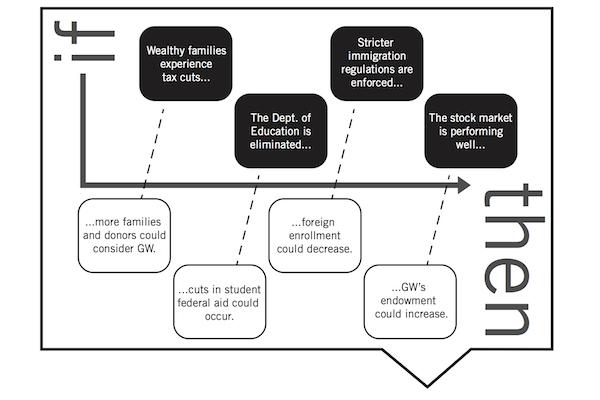As Inauguration Day nears, officials and faculty across the country are discussing approaches to potential hits to the financial health of higher education institutions – including GW.
Although it’s uncertain what policies that affect higher education President-elect Donald Trump will enact, some of his proposed tax policies and education reforms could impact GW’s financial foundation, fundraising and research.
Trump’s website does not outline specific policies for higher education, but speculation about cuts to federal aid, privatization of the student loan system and regulations on endowment spending have drawn ire from universities’ leaders.
University spokesman Brett Zongker said GW will not alter resources and support offered to students and applicants in anticipation of any financial policy changes.
“We are not in a position to speculate on President-elect Trump’s policies,” Zongker said in an email. “As we have said in the past, we will continue to monitor market conditions and our capital needs and make strategic decisions that invest in the institution and support the academic and financial health of the University.”
John Banzhaf, a public interest law professor, said the most significant effects of these policies could be on research funding. Because Trump has emphasized a need for more “practical” and technical college opportunities, it is likely that he would cut federal support for research in humanities and politics, Banzhaf said.
The University has benefitted from federal research funding, which is expected to bring in $3 million this year in the engineering school alone. But as GW officials have worked to establish the institutions as a leader in science, technology, engineering and mathematics research, humanities faculty have complained that they are being left by the wayside – a feeling that could be perpetuated by proposed policies.
“How can we increase our share of that, and in the humanities areas and others that might not seem as immediately productive, how can we shield that if grants are cut off?” Banzhaf asked. “The time to start studying that is now rather than when it happens.”
GW and other universities with large endowments have been under scrutiny by lawmakers for the past few years, who say that universities should be required to spend a certain percentage of their financial foundations on financial aid. This effort has been led by Rep. Tom Reed, R-N.Y., and Banzhaf said the policy is likely to make headway in a Trump administration.
Banzhaf added that a boost in the stock market after Trump’s election could also improve families’ financial standings, encouraging more students to choose GW. Stocks rose significantly the morning after Trump’s election.
Anthony Yezer, a professor of economics, said in an email that while the rise in the stock market after the election could help grow the endowment, debt that the University needs to service in the next few years could see higher interest rates. The University’s debt recently surpassed $1.7 billion, which is slightly more than the endowment.
“If interest rates rise because economic activity picks up and the Fed raises short term rates, the interest cost of servicing GW debt could increase, and that would not be good,” Yezer said. “Whatever can be done now to insulate the budget from rising interest rates as debt matures and is rolled over should be done.”
Charles Garris, a professor of mechanical and aerospace engineering and the chair of the Faculty Senate’s executive committee, said because so much of GW’s endowment is invested in D.C. real estate, the financial foundation should be relatively stable, even if there are significant market fluctuations. GW owns the second-largest amount of real estate in the region, trailing only the federal government.
“The University has been very fortunate in that sense, over many years,” Garris said. “That has sheltered us from a lot of downturn, like in 2008. Universities like Harvard and Yale all had hiring freezes. We flourished in that period because we were able to hire great faculty. We didn’t have the competition for great faculty that we would normally have.”
Garris said that he is more concerned about the potential for Trump to cut federal support for low-income students. Officials have been focusing the final year of University President Steven Knapp’s term on fundraising for student aid.
Trump could also reduce the amount of available funding for some of GW’s prominent research on sustainability, Garris said.
“One of the pillars in our strategic plan is sustainability, and Trump has said that he thinks that’s a Chinese hoax,” he said. “All of the funding that we get on sustainability could be impacted.”
Garris said while he “can’t think of anything particularly optimistic” about Trump’s effect on higher education, he is confident that GW and other universities will still thrive.
“I don’t think there’s any reason for tremendous gloom – we will try to adapt and work with the system.” he said. “I think the University will do well.”







